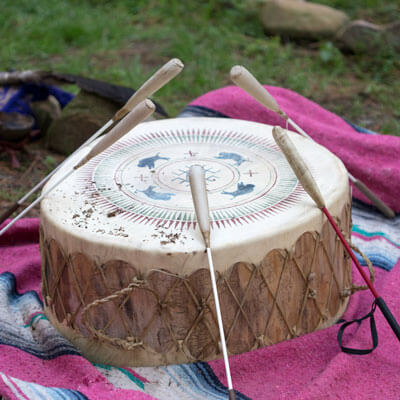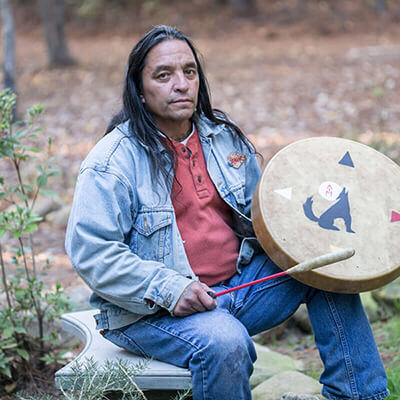Native American therapist incorporates traditional tools
Holistic approach offers mindfulness training, trauma work
Oxford Treatment Center’s newest experiential therapist is expanding the center’s holistic approach for treating drug and alcohol addiction.
Daniel Wolfshadow Winkler, LADAC-c, ACCT II-CCM, CET, joined the center’s team of experiential therapists this fall. Based primarily on the Etta campus, he works with groups and individual clients. His sessions blend 12-step principles and clinical expertise with his own deeply rooted Native American spirituality.
“In the beasts that alcohol and drugs create inside us, we lose a connection to what’s sacred,” said Winkler, a full-blooded member of the Oglala Lakota tribe. “I was raised around ceremony and traditional healing ways, so I’m able to use them in spiritual connection work with our clients.
“It’s been wonderful to have the freedom to draw from my heritage in helping clients face the root causes of addiction.”
At the Etta campus, Winkler employs drum circles, traditional ceremonies and medicine wheels. He holds most sessions outdoors, on the ropes course and the labyrinth walk, or in the surrounding natural environment.
Winkler also spends one day a week providing experiential therapy sessions for post-residential clients at Oxford Treatment Center’s Resolutions campus.
Much of Winkler’s sessions are a hands-on exercise in metaphor. By offering clients a new perspective on their own situation, he helps them break out of denial and find motivation for recovery.
“The lessons of nature are all around us, and I use them every day,” he said. “Look how the trees shed their leaves every fall, to come back new and healthy in the springtime. If we can teach the people we serve to shed the unhealthy habits they no longer need, they also can find a new version of themselves emerging fresh and clean.”
In addition to his work with groups, Winkler provides individual sessions in which clients can more deeply explore the underlying issues fueling their addictions. His training through the Native Wellness Institute has included helping individuals work through past trauma.
“There are underlying causes to our substance abuse — the core root of our addictions,” he said. “We know that genetics puts some people at higher risk for addiction, but that’s not the only factor.
“People are trying to numb a pain they don’t understand. That’s what drives them to drink and to use.”
Winkler has had his own experiences with trauma. Raised on Pine Ridge Reservation in South Dakota, he lost his father at age 11. He was raised by his grandmother. The traditional ceremonies of his people helped him overcome the anger and isolation he felt in the wake of loss.
Winkler moved south in 1998, riding his ‘91 Harley Davidson Heritage Softail Classic from the Great Plains all the way to the Appalachian foothills. He took a job in Tennessee as a guide for a wilderness therapy program for at-risk youth. It involved 28-day hikes and canoe trips down the White and Buffalo rivers.
“It was so cool to watch these children — such young spirits — work through their woundedness,” he said. “We lived together in tents and cooked together. You could see true connection work take place.”
Winkler has worked with both children and adults over the course of his career as a Certified Experiential Therapist (CET) using wilderness and adventure techniques. He holds a degree from Appalachian State University and is certified in Challenge Course Management (ACCT II-CCM), in addition to being a Licensed Alcohol and Drug Abuse Counselor (LADAC). He is also a certified Wilderness First Responder.
Winkler spends three days a week in Mississippi but continues to call Tennessee home. He has completed Applied Suicide Intervention Skills Training through Tennessee Suicide Prevention Network. He also serves on a behavioral health and suicide prevention council for Hickman and Perry counties.
In joining Oxford Treatment Center, Winkler is part of a treatment team that includes traditional and experiential therapists as well as medical staff. The center’s interdisciplinary approach allows the team to monitor each patient’s progress from multiple angles.
“All of us as a team are walking this journey with the people we serve,” Winkler said. “It does take all of us. I might see something the primary therapist needs to know, and others inform the way I’m working with our clients.
“The most important thing for our clients to know is that we’re walking with them. The people on staff here are not just somebody with a nametag. This is a place where people truly care.”
Three ways Winker’s work is aiding recovery at Oxford Treatment Center
Addiction disconnects people from others, from their inner selves, and from the world around them. Beginning to rebuild those connections is part of the work of treatment.
Using Native American drum circles, Winkler gives clients a connectedness experience that resonates. Each client in the circle is given a drum, with Winkler at a main drum in the center.
“They start by feeling their own heart and match that beat, then I get them to raise the tempo and have them walk in unison,” he says. “You have 20 people from all different walks of life who’ve come here and now are working a rhythm together.”
Winkler throws in a challenge, directing them to exchange instruments without missing a beat, or to let others create a new rhythm as the steady drumbeats continue.
“It’s confusing at first, but you watch them pick it up and everyone stays on beat,” he says. “When we slow it down, everyone’s heart is beating at the same level. The whole experience teaches so much about not only communication, but also community and support.”
Living fully in the present moment is a skill that therapists work to build in clients, for all the benefits it offers in a healthy recovery. Winkler incorporates the approach in all his sessions, even those as simple as taking a walk together in the woods.
On a recent day, he led a therapy group to nearby Puskus Lake in the Holly Springs National Forest. They had conversations around how they treat others, think about others and speak of others. But they also simply sat by the lake, played football and Frisbees, and ate sandwiches.
“You would be surprised how many of the folks we walk this journey with have never done things like this sober,” Winkler says. “All of them say they find so much peace and comfort in these things — just being in a natural environment and having a simple, fun day together.”
“Secrets make us sick and keep us sick,” Winkler says. “They become burdens that keep people from moving forward in recovery.”
Drawing from Native American traditions of painting horses for battle, he invites clients to use non-toxic paints to depict their burdens on the backs of horses.
“The horse is designed to carry our burdens, to be our friend for us to lean on,” he says. “Painting your story on a horse draws so much out — things they haven’t thought about before, questions about why they’ve done the things they did. Then to allow the horse to symbolically carry it for them is a powerful release.”
Clients bathe the horses and see their burdens washed away. Even better, Winkler says, on rainy days the experience can show the cleansing power of nature, as clients watch their burdens fade away from the horses’ rain-soaked hides.
American Addiction Centers (AAC) is committed to delivering original, truthful, accurate, unbiased, and medically current information. We strive to create content that is clear, concise, and easy to understand.
While we are unable to respond to your feedback directly, we'll use this information to improve our online help.


